Kategorie: ‘Mechanical Engineering’
Internship at Mercedes Formula One Team in the UK
- Business Administration and Engineering: Mechanical Engineering B.Sc.
- United Kingdom, Brackley
- Mercedes-AMG Petronas Formula One Team
- 07/2023 – 07/2024
Application/Finding an internship
The application process for the internship was quite lengthy and kicked off around September 2022 for a start in July 2023. In England, it is very common for students to include a year in industry in their studies, so you will find many available internships across various fields. The duration is usually one year because this is the standard period for university students unless it is a pure summer internship. Ultimately, the internship duration will depend on which internship you apply for and what is offered by the companies you are applying to. If it is a bigger, international company, it is very likely that they will help you a lot with the application process for a visa and put you on a company insurance scheme. This can differ significantly between companies. Following people from that company on LinkedIn can help you if internship positions become available as they are often shared there too.
Accomodation & Living expenses
While grocery prices are in a similar range as German grocery prices, the costs for housing and running costs such as electricity, gas, and water will be significantly higher in the UK. For me, they came out at around £80/month per person in a shared house with two other people, which is very high. Rent was over £500/month per person too, which is around what you can expect in this area and is comparable to what other interns living in or near Brackley had to pay as well. Still, this comes as quite a shock when moving to the English countryside from a German university city. Breakfast, lunch, and dinner were served in the company restaurant, and I usually ate lunch and dinner there for £2.80 per meal. The food was delicious, and the menu changes every week to offer great variety.
As Brackley is a small town, you will have to work through the local letting agencies’ websites, but there is a good network of incoming and leaving interns that provides opportunities to easily take over apartments, which I highly recommend. This also alleviates the pressure to buy furniture as the places either come furnished or you will be able to buy furniture off your predecessors at a low price. To be able to rent an apartment, you will need a valid visa. Many letting agencies will be understanding of these circumstances and offer to wait for your visa approval. After the visa gets confirmed, you can then take the next steps to set up a UK bank account, for which I recommend Revolut. Also, with a registered address, you will be able to apply for an NI (National Insurance) number, which is crucial for the company to pay you a salary.
Everyday life/ the internship

© Nicolas Musiol
Apart from the amazing work atmosphere and interesting projects that the team entrusted me with, you will work alongside a young team and will join the company with a group of around 40 interns/industrial placements (short IPs). Working on projects together, enjoying lunches and dinners in the Hub (the company restaurant), quickly formed a big group of close friends. You’ll find yourself very quickly going to the local pubs or to parties in Banbury or Oxford together. Out of the 40 IPs, there is always a good mix of internationals with Brits. My year had people from Australia, the US, Canada, Luxembourg, Austria, Germany, the Netherlands, Croatia, Ireland, and England, which made for a very interesting mix of people.
Many other sports clubs give you the opportunity to mingle with locals, as Mercedes has its own cycling club, a football team, and many sports courses. Outside of the company, you will find a tennis club, a rugby club, and a leisure centre with a pool, so there are plenty of activities for you to do in your free time. I would also highly recommend volunteering at the local football club. Every Wednesday around lunchtime, they organize a lunch for the elderly and disabled at the clubhouse, and they are always looking for a helping hand. They have lovely stories to tell, and you will find that many of them can give you great recommendations as they know the area inside out.
Free time/tips
Weekend trips with my newly found friends took me to Liverpool, Bath, Bristol, Cornwall, and on a ski trip to the French Alps, and many smaller adventures. A fantastic weekend activity is trying to complete all the local parkruns, which is a local run event held every Saturday at 9 am over a distance of 5 km. You can put all your running experience to the test by competing in the annual Silverstone Race in May, where you lap the race circuit two times for a race distance of 10 km. Great views along the way and thousands of participating runners make it a great event.
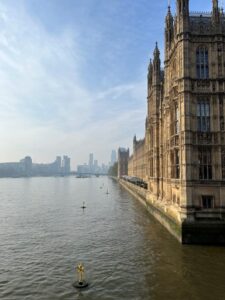
© Nicolas Musiol
Being located close to Banbury, which has a train station with a direct connection to Birmingham and London, one can hop on a bus to the neighbouring towns and villages to explore those or use them as a transit possibility to explore the country. A day trip or weekend trip to London is always great fun, and I’ve been many times now, as I’ve come to love London for the many different boroughs like Shoreditch, Camden, Kensington, Chelsea, and more. Each of them has a unique vibe, cool cafes, shops, restaurants, and pubs which are worth exploring.
Around Brackley, there are two airfields, both within walking distance. They make for a nice jog around them while small sports planes take off over your head or land on the small runways. For the daring, they even offer tandem parachuting. You can also visit the many golf clubs around and test your swing on the driving range. You only have to pay for balls as they will give you clubs to practice with if you don’t have any.
There are nice cafes all around Brackley as well, my personal favourites being The Old Fire Station in Brackley or the Post Office Café in Evenley. I can also recommend taking the bus to Oxford and visiting museums there, going punting on the canals, or visiting the local colleges.
There is also Stowe School in Buckingham only a few minutes away if you have a bicycle. The Stowe estate has a scenic park with many beautiful temples and arches. It makes for a nice afternoon stroll, especially on nice summer evenings.
Conclusion
All in all, I can only recommend committing to an international internship and immersing oneself in a foreign environment. Even though a full year exceeds the mandatory internship requirements of the RWTH, I can assure everyone it is an amazing experience, and I would do it again without a shadow of a doubt. I’ve greatly benefited from this year in the UK, not only professionally by working my dream job in F1 but also personally by meeting a lot of amazing people.
My experiences at Tsinghua University
- Business Administration and Engineering: Mechanical Engineering M.Sc
- China (VR), Beijing (Peking)
- Tsinghua University
- 09/2023 – 07/2024
Before the stay
Course Planning: It is recommended to get an overview of the selectable courses at Tsinghua University, depending on the respective department, such as Mechanical Engineering, Industrial Engineering, Energy & Power Engineering, and Automotive Engineering. Additionally, it is strongly advised to clarify which classes are eligible for acknowledgment – both Aachen courses at Tsinghua University and Tsinghua courses at RWTH Aachen. One must be cautious about course acknowledgements between Tsinghua University and RWTH Aachen. Based on past experiences, it is generally more challenging to get Aachen courses acknowledged at Tsinghua University than the reverse. This discrepancy necessitates early communication with both institutions. Students should verify which Tsinghua courses will be recognized for credit upon return.
Visa: After receiving the Tsinghua University acceptance letter confirming your stay abroad, a visa appointment should be made as soon as possible. It is likely that the Tsinghua University acceptance letter may arrive quite late. In the past, it was possible to make appointments at both the Düsseldorf Visa Centre and the Frankfurt/Main Visa Centre. Currently, according to my information, the Düsseldorf Visa Centre is closed. If time before departure to China is short, it is recommended to visit the Frankfurt/Main Visa Centre and pick up the visa personally. This way, it is possible to receive the visa within approximately 3-5 days, based on 2023 information. The visa application process involves filling out a detailed online form prior to the appointment. It is recommended to gather all necessary documents, including the acceptance letter, passport (which is valid for the whole stay plus six months, that is, at least 18 months), possibly recent photographs, before beginning the application. Completing this step efficiently can prevent unnecessary delays.
Health and Vaccinations: According to my GP in Germany, no extra vaccinations were needed. However, depending on your travel destinations in East Asia during the winter break in January and February, it might be recommended to receive vaccinations against typhus, hepatitis B, rabies (3-4 doses), and yellow fever. Students should consult their GP or healthcare provider in advance to ensure they are adequately prepared for any planned travel in the region. Besides, it is recommended to sign up for an international health insurance for the complete year.
Travels: It might be helpful to book a flight to Beijing about three months in advance. Possibly due to low demand for flights between Germany and China, the prices for one-way flights were generally rather low (between 350-500 Euros, depending on the booking time). For those planning a round-trip, one challenge is that flights generally can only be booked up to 365 days in advance. Given that the return flight will likely be in July, longer than a year from the outbound flight, this limitation can be an issue. One solution is to book a relatively inexpensive round-trip ticket and postpone the return flight once the return date is finalized. Some airlines offer flexible options for changing the return flight at a low cost, making this a potentially more economical option than booking two separate one-way flights.
Experience in the host country
Accommodation: Tsinghua University offers various dormitory options on campus for international students. There are three different room types available for internationals: First, single rooms with a private bathroom and a small sink (“Single Rooms”). Second, double rooms with shared bathrooms and separate bedrooms (“AB-rooms”). Third, double rooms that consist of a shared bedroom only (“Double Rooms”). The latter do not include any private bathroom or kitchen, as these are shared by the entire floor. The university is gradually renovating all Single Rooms, converting them into Double Rooms. Consequently, the likelihood of securing a Single Room or AB-room will steadily decrease over time. The 2023/24 Aachen cohort was the first to receive Double Rooms instead of Single Rooms.
Most of the 2023/24 Aachen cohort lived in Zijing Building 23, with a few students placed in Building 19 or Building 6. Buildings 6, 22, and 23 are recommended, if possible, as these are relatively newly renovated buildings.
In general, life in the dormitories is communal, with shared spaces like bathrooms and kitchens (depending on the room type). This setup encourages interaction among students, fostering a sense of community. However, it also requires some adjustment, particularly for those used to more privacy.
Dining and Food: Tsinghua University has a lot of dining halls on campus, offering a great variety of food options with a very high quality. The meals are very affordable (normally between 0,80 Euros – 3,00 Euros) and cater to diverse tastes, with a mix of Chinese cuisine and many international options. For those who prefer cooking, some dormitories have shared kitchens where students can prepare their own meals. The quality of the canteens, however, are outstanding for college food.
Off-campus, the Haidian district offers numerous restaurants and food stalls, where students can explore local Beijing cuisine. Street food is also popular and provides a quick and inexpensive way to enjoy traditional Chinese snacks.
Extracurricular Activities: Tsinghua University is known for its vibrant campus life. There are numerous clubs and societies catering to various interests, including sports, arts, music, and technology. For international students, joining these clubs is a great way to meet new people, practice language skills, and immerse in Chinese culture.
Sports facilities at Tsinghua are top-notch, with options for basketball, soccer, swimming, tennis, and more – all of them quite close to most of the international dorms (Zijing 18-23). The university encourages students to stay active, and many participate in regular sports activities. The high-end on-campus gym and fitness centers are also popular among students.
Cultural activities are abundant, with events such as traditional Chinese festivals and holidays, art exhibitions, and extraordinary performances regularly held on campus. Tsinghua’s proximity to cultural landmarks in Beijing also makes it easy for students to explore the city’s rich history during weekends or holidays.
Transportation: Getting around Tsinghua University is convenient, as the campus is well-connected by public transport. Bicycles (especially Blue Bikes from HelloBike) are a popular mode of transportation among students, as the campus is large, and cycling is often the quickest way to get to classes or dining halls. For longer trips, the Beijing subway system is easily accessible from the university, providing a reliable and efficient way to explore the city.
Challenges and Adaptation: For international students, adapting to life at Tsinghua can be both exciting and challenging. The language barrier and cultural differences may initially pose difficulties, but the university offers support services, including language classes and international student offices, to help ease the transition. The campus community is generally welcoming, and many Chinese students are happy and eager to practice their English and learn about other cultures, which can make integration easier.
Daily life at Tsinghua University is dynamic and diverse, offering a mix of academic rigor, cultural experiences, and social engagement. While the challenges of studying at one of China’s top universities can be demanding, the opportunities for personal growth and cultural exchange make it a rewarding experience for both local and international students. Whether through academics, campus life, or exploring Beijing, students at Tsinghua have the chance to engage deeply with both their studies and the rich cultural environment surrounding them.
Experience at the host institution
Academic Life: In our case, classes typically started at 9:00 AM in the first semester. The university offers a wide range of courses across its 21 schools and 59 departments. For international students, classes might vary depending on the department and program, but the workload is generally not too demanding, but quite extensive. Students often attend lectures, participate in group discussions, and engage in research projects. The grading in general is quite fair and benevolent.
Coursework at Tsinghua is challenging, with high expectations from professors. However, the university provides ample resources to support students, including libraries, research facilities, and academic advisors. International students may find the Chinese language barrier challenging at times, though many courses are offered in English, particularly in graduate programs.
Culture at Tsinghua: Tsinghua University provides a rich array of cultural opportunities that allow students to immerse themselves in Chinese history, arts, and traditions. The university regularly hosts cultural events such as Chinese music performances, traditional dance showcases, and art exhibitions that celebrate the country’s heritage. Students can explore Tsinghua’s and Beijing’s renowned museums (Tsinghua has got two of them), participate in traditional arts and crafts workshops, and attend festivals like Chinese New Year, the Mid-Autumn Festival, the Moon Festival, or the Dragonboat Festival which are celebrated with great enthusiasm on campus. Tsinghua’s proximity to cultural landmarks, such as the Forbidden City, the Temple of Heaven, and the Summer Palace, also offers students a chance to delve deeper into China’s historical treasures. Furthermore, engaging with Chinese students through clubs, sports, music, social events, and collaborative projects provides invaluable insights into contemporary Chinese culture and customs. These interactions foster cross-cultural friendships, where international students can learn directly from their peers about local traditions, cuisine, language, and daily life, enriching their overall experience at Tsinghua.
10 tips for new students at Tsinghua University on how to make the most of a one-year stay:
1. Explore Beijing’s Cultural Heritage: Take advantage of Tsinghua’s location in Beijing by visiting iconic landmarks like the Forbidden City, the Great Wall, the Summer Palace, and the Temple of Heaven. These historical sites offer a deep dive into Chinese culture and history.
2. Participate in Campus Festivals and Events: Engage in traditional Chinese festivals like Mid-Autumn Festival celebration on campus. These events provide a unique cultural experience and an opportunity to bond with fellow students.
3. Attend Cultural Performances: Tsinghua hosts various cultural events, including Chinese opera, (traditional Chinese) music concerts, and dance performances. These are great opportunities to experience traditional and modern Chinese arts firsthand.
4. Visit Local Markets and Try Chinese Cuisine: Explore Beijing’s and other cities’ local markets. In Beijing, the Silk Market and the Pearl Market are highly recommended, if you are interested in bargaining. Also, be adventurous with Chinese cuisine by trying local dishes such as Peking duck, hotpot, and dumplings.
5. Explore China Beyond Beijing: Plan trips to other parts of China during breaks. Visit cities like Shanghai, Xi’an, Qingdao, or Chengdu to experience the diversity of China’s landscapes, history, and culture.
6. Engage with Chinese Students: Building friendships with local students is invaluable. Join language exchange programs, participate in group projects, or simply hang out at campus cafes to foster these connections and gain deeper insights into Chinese culture.
7. Join a Student Club or Organization: Tsinghua has a wide range of student clubs, from sports across arts to technology. Joining a club is a great way to meet new people, develop new skills, and immerse yourself in campus life.
8. Learn Mandarin: While many courses are offered in English, learning some Mandarin will enhance your experience and make daily life easier. The university offers language courses, and practicing with local students will definitely accelerate your learning.
9. Take Advantage of Tsinghua’s Academic Resources: Make use of the university’s libraries, research facilities, and academic lectures. Attend guest lectures by prominent scholars and leaders from various fields to broaden your knowledge.
10. Stay Active and Use Campus Facilities: Tsinghua has excellent sports facilities, including gyms, swimming pools (inside and outside), and sports fields. Regular physical activity can help you stay healthy and relieve stress during your stay.
What added value did the stay have for my studies/career prospects?
A stay at Tsinghua University significantly enhanced my studies and career prospects in several ways.
Academic Excellence: Tsinghua University is renowned for its high academic standards and rigorous programs, especially in fields like engineering, technology, and business. The exposure to cutting-edge research, advanced coursework, a high focus on teamwork, and a global academic environment deepened my knowledge and skills in my field of study. This academic rigor might be highly regarded by employers and can set one apart in competitive job markets.
Language and Cultural Skills: Learning Mandarin and immersing myself in Chinese culture has been a big benefit, especially if one intends to work in industries or companies that have strong ties to China. Proficiency in Mandarin and an understanding of Chinese business practices can make someone a valuable asset to multinational companies or organizations operating in China.
Global Perspective: Studying at one of China’s top universities provides a unique international experience. It allowed me to gain insights into China’s rapidly growing economy, technological advancements, and global influence. This international exposure can make one more adaptable and culturally aware, qualities that might be increasingly valued in today’s globalized world.
Problem-Solving and Adaptability: Living and studying in a new country requires adaptability and resilience. The challenges I overcame during my time at Tsinghua, whether related to academics, language, or cultural issues, helped me to develop problem-solving skills and the ability to thrive in diverse environments. These are qualities that might be valued by employers in any industry.
Career Opportunities in China: China’s economy continues to grow, and having experience at a Chinese university like Tsinghua can open up career opportunities within China or with Chinese companies abroad. Being part of the Tsinghua alumni network can also provide valuable career opportunities.
Networking Opportunities: Tsinghua University attracts some of the brightest minds from China and around the world, offering an excellent opportunity to build a global professional network. The connections you make with fellow students, faculty, and industry professionals can open doors to future collaborations, job opportunities, and mentorship.
In summary, your stay at Tsinghua University not only enriches your academic background but also equips you with valuable skills, global perspectives, and professional networks that can significantly boost your future life both in China and internationally.
To what extent does my stay abroad have a sustainable character? To what extent could the general public also benefit from my personal experience?
My stay abroad at Tsinghua University has a sustainable character in both environmental and social aspects, with potential benefits that extend beyond my personal experience. By immersing myself in China’s approach to sustainability and environmental practices, particularly in areas like energy, engineering, and electromobility, I have gained valuable insights into how we can implement more sustainable solutions in our own communities. For example, learning about cutting-edge renewable energy technologies and urban sustainability initiatives at Tsinghua and in Beijing, especially regarding electromobility and public transport, allows me to bring back knowledge that can be applied to projects aimed at reducing environmental impact and promoting greener practices in my home country. This might contribute to a more sustainable future by helping to develop solutions that minimize resource consumption, lower emissions, and promote long-term environmental health.
On a social and cultural level, the public might benefit from my experiences through the sharing of cultural knowledge and perspectives. By engaging with local communities and sharing my experiences, I can help foster greater cross-cultural understanding and empathy, which is crucial in an increasingly globalized and polarized world. This cultural exchange can also lead to stronger social bonds and collaboration between different communities, promoting peace and mutual respect.
Emotionally, the empathy and cultural sensitivity I have developed through this experience allow me to better relate to people from diverse backgrounds, which can positively influence my interactions with others. This emotional experience can help in creating more inclusive and supportive environments, whether in the workplace or in the community.
Financially, the skills and knowledge I have gained might lead to more effective and innovative approaches in my field, which could translate into economic benefits. For example, by applying sustainable engineering practices learned, I can contribute to cost-saving measures and resource efficiency in projects, which benefits not only companies but also society as a whole by reducing environmental costs and promoting sustainable growth.
In summary, my stay at Tsinghua University allows me to bring back knowledge and practices that contribute to environmental sustainability, while also fostering social and cultural benefits for the public. By sharing my experiences and applying what I have learned, I can help create a more sustainable, inclusive, and interconnected society.
Writing a master thesis in Italy
- Plastics and Textile Technology M.Sc.
- Italy, Bollate(MI)
- SYENSQO Specialty Polymers Italy S.p.A.
- 10/2023-03/2024
Application/Finding a master thesis
As in most study programs, you can choose to write your thesis at the university or externally in a company. For this reason, it was clear to me at an early stage that I wanted to write my Master’s thesis externally in order to gain further important practical experience. The contact to the former SOLVAY (SOLVAY has outsourced its Specialty Polymer Business Unit and founded its own company, which is now called SYENSQO) was made via the IKV Recruiting Speed Dating. There I was able to get to know my current supervisor in a brief in
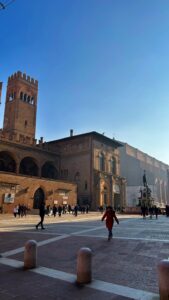
© Cihan Koyuncu
Bologna
terview and discuss my ideas about an external master’s thesis. It was no problem to get a confirmation, as both sides were interested in carrying out a Master’s thesis. As the Bollate site has never had a Master’s student outside of Italy before, in addition to the selection of the topic, a number of things had to be clarified with regard to insurance, contract, payment and other regulations. These points were resolved within almost a year via several meetings with various departments of the company or the university, so that I was able to start in Italy on time on 01.10.2023. For a good planning of a stay abroad, 9-12 months should be taken into account. If you are going to work abroad, you should find out about tax matters in advance. In the case of Italy, a Codice Viscale is required, which you can apply for at any Italian embassy in Germany.
Accommondation & Living expenses
Since I needed a furnished apartment, I used AirBnB to ask the various apartment providers for a long-term contract. This allowed me to reduce the price a little, as I was able to save on Airbnb’s fees and they were able to accommodate me in terms of price due to the 6-month stay. As Italians rarely speak English, there were considerable communication problems with some of the locals. For this reason, communication often took place via Deepl in order to at least get the message across. Financing an apartment in Milan would not have been possible despite the salary and the Erasmus money. That’s why I first lived in Limbiate and later in Magenta. This saved me the high rents in Milan. Nevertheless, I had to spend more on gas and have to travel 30-60 minutes to get to work, depending on the traffic. The remaining costs were comparatively slightly lower than in Germany. Despite this, I was able to travel a lot and generally had a very good time in Italy. Many museums and attractions are free for young adults under 25. Restaurants are comparatively cheaper as German restaurants and the quality of the food is significantly better. I was able to save some money, because the meals at work were free for me.
Everyday life/the internship
I had a 40-hour contract and therefore spent 9 hours a day in Bollate including a break. In the morning I left the house at 8:30 a.m. and was there at around 9:15 a.m. Because the working hours were flexible, I was able to come and go whenever I wanted. The most important thing was that I fulfill my tasks with high quality and at the same time deliver them on time. Due to the early work traffic, I deliberately drove to work later and was therefore able to reduce travel times. Whenever my supervisor worked from home, I was also allowed to work from home. At Syensqo, in addition to my master’s thesis, I took part in regular work operations and was therefore able to help out with some projects on the side. I was able to get to know many colleagues from the site, exchange ideas and work together. Among other things, we had contact with colleagues in Lyon, France and Alpharetta, USA. The lunch break enabled me to get to know my colleagues better.
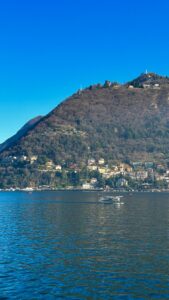
© Cihan Koyuncu
Lake Como
Here in Italy great value is placed on food culture. In the canteen there is a first (primi) and second (secondi) course in addition to salad and dessert every day. After every lunch break we sat down together for an espresso. Afterwards you were fit enough to devote yourself to work again.
The master’s thesis was about the comparison of high-performance tribological plastic compounds with and without PTFE. I examined the tribological parameters (COF, wear, PV limit) of various compounds and compared them with each other. This made it possible to determine the effect of graphite and other tribological additives on the tribological properties. In addition, two different methods for determining the tribological properties were compared.
After work there wasn’t much time left for other activities. I often did sports or studied for upcoming exams in the evenings. I was also allowed to fly back to Germany for the exams and work from my home office for several weeks. I was also able to get to know SYENSQO’s German location in Duesseldorf. What pleasantly surprised me was that even in Germany the colleagues were international. My colleagues were therefore predominantly Italian, but there were also some French, Austrian, Irish, Turkish and German colleagues. The working language was English, which is why my English improved significantly over these six months. But I also had the opportunity to learn some Italian.
It was particularly exciting to find out about everyday matters in Italy, all of which are different in Germany. Shopping, paying tolls or even washing the car was a bit of a challenge at first, but we were quickly able to figure it out with the help of the internet and by asking the locals. Even though many Italians were either unwilling to speak English or simply couldn’t speak it, a lot was communicated via gestures and facial expressions and, if necessary, communicated directly in Italian using Google Translate.
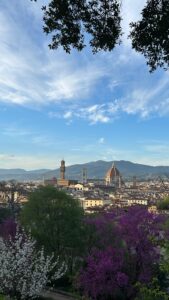
© Cihan Koyuncu
Florence
Free time/tips
During the six months I was there, I wanted to see as much of Italy as possible. That’s why I spent most of my free time at the weekend travelling around the cities. The cultural sights and churches in particular are a definite must-see. The train connections in Italy are very good, much more punctual than in Germany and comparatively cheaper. I often slept in cheap hostels so that I could finance this amount of travelling. You can be lucky, but you can also be unlucky, which is why it’s well worth doing your research beforehand. Most sights in Italy are free for EU citizens under 25. Student discounts are rare, but in the cases where they were offered, I often didn’t have to show anything. Tickets for attractions could often be booked online in advance, which saved precious waiting time. However, you often had to pay by credit card. Here is a list of the cities I visited and my most important tips for a stay there.
Milan
Despite the fact that it is a world metropolis, Milan is actually the city that is least worth seeing in my opinion. This is not because the city itself is not beautiful, but rather because I liked all the other cities much better. The main sights in Milan are the cathedral and the Galleria Vittorio Emanuelle II, both of which are located directly on the cathedral square. You can visit the cathedral and even go up to the roof of the cathedral. Milan’s Arc de Triomphe and the neighbouring park are also very beautiful. If you walk through the park, you quickly come to a former castle, which you can also visit. There are many culinary options in Milan. Above all, a visit to China Town is worthwhile, especially in the evening. You can also visit the Cimitero Monumentale (Milan’s old cemetery) with its incredibly beautiful sculptures and tombs. Important Milanese personalities are also buried there, so it’s worth checking out who is buried there first. You can also visit the original “Last Supper” by Da Vinci in Milan. However, getting tickets for this was much more complicated than usual, which is why I unfortunately missed it.
Como
If you live near Como, I think it’s worth making several trips to Como and especially to enjoy the beautiful view.
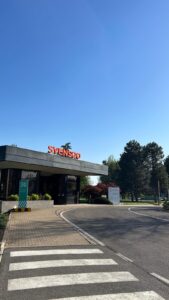
© Cihan Koyuncu
Syensqo
Como is located on Lake Como and from there you can visit the numerous small villages on the lake. It is probably one of the most beautiful places in Italy, especially in summer. In Como, you can also book tickets for a boat tour that will take you to the villages on the lake.
Bergamo
Bergamo is one of the smaller cities in the Milan metropolitan region. Bergamo’s old town is situated on a hill, so you can either climb up the numerous steps or take the mountain railway (€1.70 each way). A beautiful old town centre awaits you at the top. The two churches on the market square are particularly worth a visit. I can particularly recommend foccacia at Il Fornaio and the original and first straciatella ice cream at La Marianna. A short day trip is enough to fully explore Bergamo.
Verona
Verona also has a beautiful old town centre. I was only able to stay there for a few hours on the way back from Venice. I can only encourage everyone to visit this city. Verona is also the city of Romeo and Juliet.
Venice
I don’t think I need to say much about Venice. Beautiful city with numerous canals, but unfortunately with a lot of tourists. Even if you just stroll through the streets of Venice, you can see a lot of beautiful things there. The big sights are definitely the Doge’s Palace and St. Mark’s Basilica. The Venice Opera is definitely worth seeing.
Turin
Very few people have an eye on the city on the Po. Still a very beautiful city that is definitely worth a day trip. The Musei Reali contains some really beautiful art and should definitely be visited. There is also a very nice car museum in Turin for all car enthusiasts. But definitely don’t miss the opportunity to take a walk along the Po.
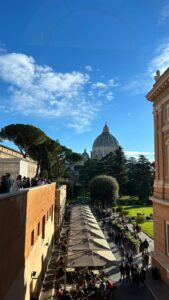
© Cihan Koyuncu
Vatican
Genoa
The largest connected old town in the world can be found in Genoa. I was rather suspicious when I looked at the pictures on the Internet, but I was even more enthusiastic about this city once I was there. Therefore a must for everyone who wants to see a very extravagant, very wealthy city in Italy with a French flair.
Florence
The city of the Medici, an absolute must-see for anyone who has been to Italy. The Galleria dell’Academica and the Uffizi are a must-visit, especially for art enthusiasts. There you can see, among other things, the impressive original David sculpture. The magnificent Duomo in Florence is beautiful from the outside. But save yourself the waiting time and don’t go in, as it’s even bareer inside. For everyone who likes to learn about the history of Italy and Florence. Most and important Medicis, Donatello and 1-2 popes are buried in the Medici Chapel. You can get a good view of the city from one of Florence’s gardens, but you have to pay an entrance fee. Instead you can go to Piazzale Michelangelo and watch the sunset from there. You can get a good view of the city from one of Florence’s gardens, but you have to pay an entrance fee. Instead you can go to Piazzale Michelangelo and watch the sunset from there.
Rome
You should generally plan 3-4 days for Rome because you can see so much. Therefore, you should plan well in advance. The only tip I would like to give about Rome. Be sure to book tickets for the Vatican Museum in advance (1-2 weeks in advance). Otherwise you have to wait in line for up to 3 hours. But it was still worth it because you can see, among other things, the Sistine Chapel and with it the famous chapel painting by Michelangelo (The Creation of Adam).
So as became clear, spending time on weekends, holidays and good planning meant I was able to travel a lot. Even though this meant foregoing most of the other luxuries, I think I made the most of my time in Italy.
Conclusion
I am very satisfied and grateful for the opportunity to have been abroad. This would not have been possible without the support of Erasmus+. Not only was I able to gain important experience but I was also able to grow as a person. Living abroad is an experience that I would recommend to everyone and that will definitely provide personal growth. From today’s perspective I might approach certain points differently, but overall I’m very happy with how these six months went. The six months at SYENSQO also showed me what the working world looks like in other countries and how it can differ from that in Germany. Important experiences that I will carry with me in my life regarding international understanding. I can only recommend that everyone take a stay abroad as part of their studies. Above all, I can recommend everyone to visit this beautiful country, absorb the culture and experience all the beautiful things that I could only touch on here as part of the report.
Internship in Bilbao
- Business Administration and Engineering: Mechanical Engineering M.Sc.
- Spain, Bilbao
- FEV Consulting Iberia
- 10/23 – 02/24
Application/Finding an internship
I started the internship search for an internship in Spain very early (about 5 months before the start of the internship), as it is advisable to expect sufficient lead time for applications
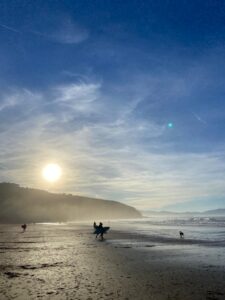
© Johann von Harling
Surfing beach in Sopelana
for internships abroad. I narrowed down the internship search to Spain because I am very interested in this country and also wanted to deepen my language skills. My approach to the application process involved systematically identifying companies in my area of specialization through internet research and searching for internship openings in the Career section of each website. Additionally, I also sent spontaneous applications to smaller companies. With larger companies, there is a greater likelihood that English is required or accepted as a working language. Many companies require foreign interns to complete the internship for longer than 6 months due to tax benefits, which limited my application to numerous companies. In the end, I found a German company with a location in Spain (Bilbao), which operates internationally in the field of technology consulting for the automotive industry and other technology sectors. I applied and had to go through the traditional application process for an internship in management consulting, consisting of two rounds of application involving interviews and solving a case.
Accomodation & Living expenses
For accommodation, I would recommend starting to look for apartments/rooms very early as well. Bilbao is one of the most expensive cities in Spain alongside Madrid and San Sebastian. Prices are generally comparable to those in German student cities, but they can also quickly rise to €600 or €700 for a shared room. However, it is also possible to find some very affordable rooms for around €300 with lower living standards.
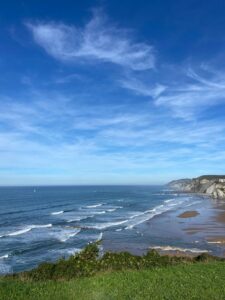
© Johann von Harling
Cost near by Bilbao
When viewing apartments, it is important to ensure that the windows are reasonably insulated for winter stays, and in summer, having air conditioning in the apartment may be necessary. When I arrived in Bilbao in October, the first few days were still very warm, with temperatures reaching up to 35°C. However, temperatures in winter also drop to very low values of around 0°C to 10°C, so having heating and well-insulated windows can contribute to comfort. Many students in Bilbao live in neighborhoods like Indautxu, Deusto, or Casco Viejo. However, there are apartments scattered throughout the city. Idealista is highly recommended as a portal for apartment hunting in Spain. Alternatively, you can also search for real estate agencies online. Bilbao is a relatively modern city for Spain, with many high buildings. On the other hand, it also has a beautiful old town area in Casco Viejo. The average living costs are quite comparable to the living costs in Germany although visits in restaurants and bars can be significantly cheaper from time to time. Prices in supermarkets are very much the same as in Germany, but the costs of a visit in bar or a restaurant can be regarding the restaurant a lot cheaper. It is also recognizable that Bilbao has one of the highest densities of Michelin Star restaurants in Spain and if you like you can as well try out the excellent cuisine.
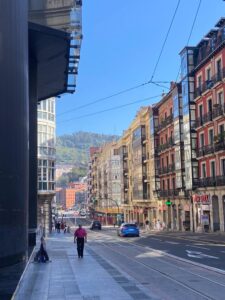
© Johann von Harling
Bilbao offering excellent transportation options with tram, metro, bus and train
Everyday life/ the internship
I completed the internship full-time, mainly in the office in downtown Bilbao. The atmosphere within the international team was very professional yet friendly outside of working hours. The predominant language in the company was English due to international projects. However, the conversation would also occasionally switch to Spanish or German, which I enjoyed and which contributed to improving my language skills in several languages. The internship involved working on technical projects, which were well-suited to the knowledge gained from studying industrial engineering. Projects in the field of electromobility, artificial intelligence, and general automotive production were the focus. The working hours for a consultancy were mostly between 8:30 am and 7:30 pm, which included most times a lunch break of half an hour to one hour, where we sat together with all the employees. Usually in the week most time was spent at the office and free time afterwards in walks around the various streets in the city and weekends were used to do bigger journeys and small trips within the near of Bilbao or other cites in Spain.
Free time/tips
Leisure time in Spain, especially in Bilbao, can be very diverse depending on the season. During the warm autumn days, trips for hiking, relaxing, swimming, and surfing along the coast of Bilbao are highly recommended. With the metro, you can reach the vicinity of the beach for €1.50 within 30 minutes and then reach it on foot after a short hike (15-20 minutes). The coastline consists of steep cliffs and long beaches. Additionally, you can also utilize the surrounding mountains near Bilbao on weekends for short hikes to get a view over the entire region. Bilbao is located in northern Spain, and there are many noteworthy cities nearby such as Santander, San Sebastian, Pamplona, Zaragoza, or even Madrid. The Cantabrian and Basque regions, in general, are highly recommended for excursions. A recommendation to create more leisure time during the internship is to strategically choose vacation days to have long weekends, allowing for short trips to more distant cities like Barcelona, etc.
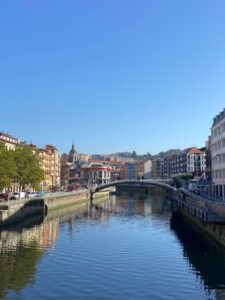
© Johann von Harling
Bilbao city quarters seperated by river
A recommendation for Bilbao is to explore the culinary diversity of Spanish specialties offered in many small local eateries. There is a rich culture of pintxos (tapas) available at many times of the day. Furthermore, Bilbao offers a lot of culture with the world-famous Guggenheim Museum or the football matches of the renowned Spanish football club Atletico Bilbao, which take place in the San Mames Stadium. I really enjoyed the internship because during that time, occasional team events were organized in which employees could participate, happening on weekends or after work. For example, there was the Bilbao Marathon, in which we could participate in various distances such as 10 km, half marathon, or marathon. During this race, the entire city was closed off for one evening, with about 13,000 people participating and many thousands more cheering on the streets of Bilbao.
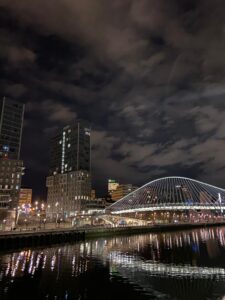
© Johann von Harling
Bilbao with modern buildings in the city center
Conclusion
An international internship is recommended for students who want to improve their language skills in a language other than their native language, are interested in new cultures, and at the same time want to experience the working style in another country within a company. Living abroad provides a different perspective on many things and broadens one’s horizons. The internship offers a very good opportunity to combine the interest in international experience with the interest in professional experience. In addition to the internship, you have the opportunity to explore new cities, different places, and another culture. Spaniards exude joy of life, which is recognizable in many everyday situations. Next to working, I really enjoyed the trips we organized either with working colleagues or with friends, where we could further explore the great cities and landscapes of Spain and discover even more how diverse this country is.
I am very glad, that I had this opportunity supported by Erasmus Internship, that offered me to experience the work culture as well as the live and culture in a different country. I hope that many people will also have this opportunity and support to experience such great possibilities.
Internship in Bilbao
- Business Administration and Engineering Mechanical Engineering M.Sc.
- Spain, Bilbao
- FEV Consulting Iberia
- 10/2023 – 01/2024
- Application/Finding an internship
Securing my Erasmus internship at FEV Consulting in Bilbao was a smooth process, given my already six-month experience as a working student at the company before applying. Informal discussions with my mentor paved the way, expressing my interest to the Bilbao office head during a professional reunion further gave me the opportunity.
Drawing from the experiences of previous German interns in the company, I tapped into an established network to gather insights and advice. What helped the process further was the early acceptance, granted six months before the start date. This provided enough time to plan and fulfill all Erasmus requirements, ensuring a well-prepared transition into this international experience.
- Accomodation & Living expenses
Securing accommodation in Bilbao proved to be a straightforward process. I aimed for a room in a recently established apartment, sharing the space with three others of working age. The monthly cost of the room was around 600€, exclusive of management and cleaning fees, alongside a one-month deposit.
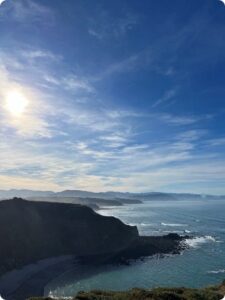
© Tom Benjamin Rummel
An advantageous aspect of my housing arrangement was the ability to review the apartment and complete the contractual formalities online prior to my arrival in Bilbao. This ensured a good transition before reaching my destination. Fortunately, my flatmates were predominantly Spanish speakers, affording me an ideal environment to practice and enhance my language skills within the rooms of my residence.
Financially, I received the Erasmus fee along with the minimum Spanish salary paid for my internship. In terms of living expenses, Bilbao’s cost of living equal my experiences in Aachen. But social outings are more economical, with soft drinks, beer, and wine averaging around 2€ per drink. Additionally, the culinary delights of the region (Pintxos, small tapas on bread) range from 2 to 3 euros per piece.
The public transportation system, particularly the metro, benefits from state subsidies, making it exceptionally affordable. A standard metro fare amounts to approximately 50 cents, contributing to the overall accessibility of transportation within the city.
- Everday life / the internship
Managing my everyday life during my Erasmus internship at FEV Consulting in Bilbao was a dynamic experience. Throughout the workweek, my days were filled with a good workload, leaving little time for activities beyond sports and cooking post-work.
While the option of working from home was available, it was relatively uncommon. I chose to commute to the office daily, a practice that proved to be beneficial. Leaving my laptop at the office made a clear separation between work and personal life, allowing me to disconnect at home without work-related considerations. This setup also provided flexibility for post-work engagements, as I carried no bag after work.
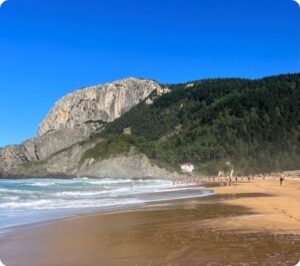
© Tom Benjamin Rummel
The standard working hours spanned from 8:30 to 18:30, including a long lunch break lasting an hour or sometimes even more. Colleagues, including myself, brought their own meals, creating a communal atmosphere during shared lunches and occasional ping pong matches.
Professionally, this period was pivotal as I undertook increased responsibilities within the company, starting with the management of my own small-scale project. English served as the primary working language, contributing to a cohesive and collaborative environment.
The office, characterized by an average age of around 28, has a cohesive and homogeneous team with shared interests. Social activities played a significant role, with a weekly soccer match against other local companies and Friday afternoons often concluding work a bit earlier. This allowed the team to go out into the lively streets of Bilbao, fostering the relations beyond the activities of the workplace.
- Free time/tips
Leveraging free time in Bilbao was an awesome exploration, as the city offered diverse options throughout the week, each drawing a varied crowd of locals spanning all age groups.
Going into different restaurants and locales became a personal priority whenever time allowed, though the city’s richness proved too big to conquer fully, even in its seemingly “small” boundaries.
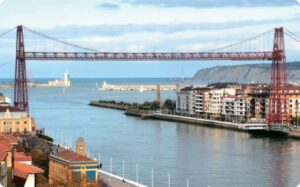
© Tom Benjamin Rummel
Three standout memories summarize my time in Spain. Foremost among them was the exploration of the seaside. The Atlantic coast unfolded a breathtaking panorama with expansive beaches, rough cliffs, and scenic paths for hikes or runs. The autumn weather allowed for enjoyable beach days, easily accessible within 30 minutes from the city center via the metro, costing just 50 cents. The surrounding regions revealed more treasures, showcasing diverse beaches and natural habitats.
On the opposite side of Bilbao lay the mountains, offering beautiful hikes with stunning views. Noteworthy expeditions included a 20 km hike to Gorbea in November and a spontaneous walk to Pagassari, a mountain right next to Bilbao. The accessibility of the countryside was evident as I strolled directly from my apartment, exemplifying the accessibility of nature next to urban living. Every favorable weekend weather was used by me to explore new surroundings, still leaving plenty of unexplored spots for future visits.
December presented an opportunity to make use of national holidays in Spain. A fellow intern and I used this chance to embark on a five-day adventure to Barcelona. The trip, undertaken by bus, a common mode of transportation in Spain, was a seven-hour journey.
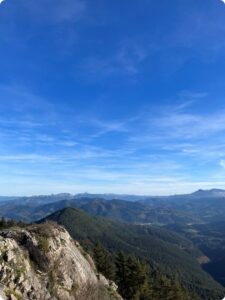
© Tom Benjamin Rummel
Barcelona welcomed us with pleasant weather and some Christmas markets, making the experience an unforgettable highlight of the whole season.
- Conclusion
Reflecting on my Erasmus internship at FEV Consulting in Bilbao, the experience surpassed my expectations in various ways. The seamless application process
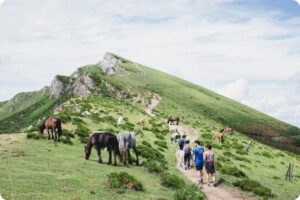
© Tom Benjamin Rummel
, coupled with the early acceptance, allowed me to embark on this adventure well-prepared and with anticipation. Living in Bilbao proved to be important for professional growth and personal enrichment. The daily routine, centered around a dynamic work environment, was complemented by the vibrant and diverse offerings of the city. The accommodating living situation, with engaging flat mates and reasonable living costs, added to the overall positive experience.
Professionally, the internship provided invaluable opportunities. From managing my first project to enhanced responsibilities, the exposure and guidance received significantly contributed to my professional development. The language-intensive work environment in English and the cohesive team dynamics created an atmosphere for learning and collaboration.
Beyond the workplace, Bilbao offered a rich diversity of experiences. Exploring the city’s culinary delights, embracing the natural beauty of the Atlantic coast and nearby mountains, and seizing opportunities for travel, particularly to Barcelona, added memorable dimensions to my time in Spain.
In conclusion, my Erasmus internship in Bilbao was a holistic journey encompassing professional growth, cultural immersion, and personal exploration. The memories stay, both within the workplace and beyond, will undoubtedly remain an important part of my academic and professional journey. As I look back, I am grateful for the experiences gained and the connections made, eagerly anticipating the chance of returning one day to continue the exploration of this region.
Research stay at the University of Oxford
- Business Administration and Engineering Mechanical Engineering M.Sc.
- United Kingdom, Oxford
- University of Oxford
- 04/2023 – 06/2023
Application/Finding an internship
During my master’s studies I developed an interest into various mathematical tools to model economic processes. Since I also wanted to take the chance to spend some more time abroad at the end of my studies, I decided to look for interesting chairs and institutes that align with my research interests to conduct my master thesis. Since the topic I was looking for was rather niche, there weren’t that many opportunities available and I quickly stumbled upon a research group at the University of Oxford after simple research on recent publicati
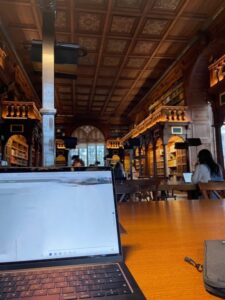
The reading room in the Old Bodleian Library.
© Jonas Schmänk
ons in my area of interest. With some background information on the coursework I have done previously and the research questions I was interested in, I reached out the administration of the institute. Luckily, two researchers reached out to me afterwards, stating that they have received my inquiry and would be happy to support the research for my thesis. After that, only some simple formalities had to be done for me to get an access card (“Bod card”) to the Universities’ libraries. I decided to physically stay in Oxford for the duration of one trimester (~2 months) since this didn’t require me to pay any fees to the University. This was a specific characteristic of the program of the receiving institute and does not necessarily hold true for other faculties as far as I know, so that should be kept in mind. The more “official” framework in which research stays in Oxford are processed through is the status of being a “recognised student”, which does require the payment of significant fees.
Accommodation & Living expenses
The University of Oxford consists of various colleges that typically provide for accommodation and food. Since I was a visitor to a specific institute and not a recognised student, it was unclear in the beginning whether I could make use of these services. Therefore, I decided to look for private accommodation. My receiving institute provided me with a short list of some possible opportunities and I decided to stay at the Commonwealth House, a well-located shared house affiliated with a local church at the rate of roughly 750 GBP a month including a simple but totally sufficient breakfast during weekdays in a common room with other tenants. While this seemed very pricey to me initially, this rate is more at the cheaper end in the center of Oxford and is similar to the ones that are paid for for college accommodation. Overall, I was content with the accommodation but for a prolonged period one might be better off with a different place, since the sanitary facilities and the kitchen were often in rather poor condition. As I found out later, often enough colleges do have some limited availability of rooms for non-members. To find out about that, a short email to the responsible person at the college is sufficient.
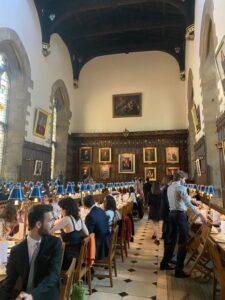
The dining hall at New College.
© Jonas Schmänk
As mentioned, breakfast was included most of the time at my accommodation. For lunch, one typically went to one of the very beautiful dining halls at the colleges, where a meal was available for between roughly 3.5-5 GBP. Groceries in the supermarket were available for a small premium compared to German prices. Overall, the ERASMUS scholarship made up for any additional expenses compared to my German student life.
Everyday life/ the internship
During my time in Oxford, I was highly flexible regarding my schedule. Typically, I started working at around 9:30 am and left at 17:30. While I had a work desk available at my institute, I often went to one of the beautiful old libraries Oxford has to offer. Since I worked on a rather programming-heavy task which didn’t require any other infrastructure than my laptop I was very flexible on where to work. Once a week, I met with my supervisors to discuss my progress and any open questions. Apart from the thesis-related tasks, I was able to join the seminars at my group, which included visits from various academics or presentations from group members regarding their current research.
Free time/tips
The possibility of activities outside of studying are almost overwhelming during term time. For once, there is probably a student society for any kind of interest. Let it be the Wine Society with frequent wine tastings, the Diplomatic Society with visits from international diplomats or the German Society with Germany-related pub quizzes, there are plenty of things to do. Furthermore, one should look out for associate memberships at one of the
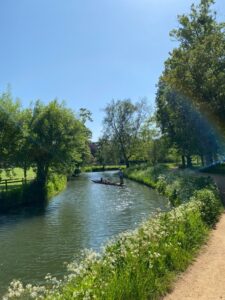
Punting through Christ Church Meadows.
© Jonas Schmänk
colleges if one is not affiliated with any of them as a regular or recognised student. The colleges offer further social activities, that are split between undergrads in the Junior Common Room (JCR) and grad students in the Middle Common Room (MCR). To find out about possibilities to join them as an associate member, one should look for the respective constitution by just googling a specific college + “MCR” [or JCR, depending on where you are in your studies] + “constitution”. Luckily, I had the chance to join New College as an associate member and therefore gained access to their activities as well, with the most noteworthy being the chance to attend their formal dinners. While these came at a cost of roughly 25 GBP, they provided a three-course meal of very high quality and the chance to mingle with other people and bring friends from other colleges. Typically, a suit or cocktail dress was obligatory for these dinners. Also, the colleges often have their own sports grounds where one can play tennis, squash or even rent a boat to go punting. The latter is something that is definitely to be done when in Oxford. The many canals and rivers provide a very scenic view on the city and the nature surrounding it. Furthermore, the University itself has a vast array of interesting talks and speeches by renowned academics which opens up further opportunities to spend free time on.
If one finds time for other things to do, Oxford also offers many nice museums, medieval colleges and pubs (my favorite being The Old Bookbinders) to explore during the day or in the evening. Also, the surroundings are worthwhile a visit. London is only a 1.5-hour bus ride away as well. I personally found it hard to find time for activities outside of Oxford during my limited time there, since the city itself has so much to offer.
Conclusion
Overall, I can highly recommend an academic stay in Oxford. Not only does the renowned university attract interesting and diverse people from all over the world, but the city also has a unique charm with its medieval colleges and libraries, creating an unparalleled atmosphere.
Research stay at Georgia Institute of Technology
- Aerospace Engineering M.Sc.
- USA, Atlanta
- Georgia Institute of Technology, Aerospace System Design Laboratory (ASDL)
- 05/2023 – 09/2023
Application and Preparation
There has been a long-standing relationship between the Institute of Aerospace Systems (ILR) and the renowned Aerospace System Design Laboratory (ASDL) in Atlanta. Due to my activities as a bachelor student and as a student assistant for many years at ILR, I was given the unique opportunity to spend a research period at ASDL and to work there. The cooperation exists between the professors at both institutes.
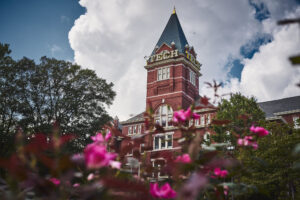
Tech Tower of Georgia Institute of Technology
© Johannes Götz
In November 2022, I started planning and approached ILR about my desire to go there. Due to the choice of my area of work – the ASDL has six great research branches – the visa issuance and the related working documents took a few months. In May 2023, I could already start working remotely and got to know the team. From July until the end of September, I was on site at the Laboratory and worked there as a research assistant. Since I worked in a project belonging to the Defense & Space division, I had to wait some time for my DS-2019 (important work permit).
Accommodation and Living Situation in Atlanta
Finding housing in Atlanta is proving to be difficult. You must be careful at what time you are there because the semester times are very different from ours. In the summer, it is relatively easy to get an apartment for subletting. Facebook groups are excellent for this purpose. However, as always with such portals you must be warned of potential scammers. I first moved into a shared apartment and later into an Airbnb because the semester starts again at the end of August and the apartment search is extremely difficult then. The rental costs are at least about 1500$ per month. Georgia Tech supports you with the purchase of a monthly ticket for the local bus and train transport, called MARTA.
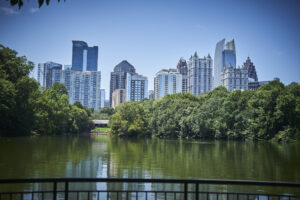
View of Atlanta Midtown from Piedmont Park
© Johannes Götz
These cost $66 per month and the network is well developed by American standards. From time to time, buses and trains are cancelled, but with the appropriate apps and enough scheduled time, I had no problems moving freely in Atlanta and the surrounding area. At night, however, you just must watch out and always be aware of your surroundings. Atlanta can be dangerous at night but also very beautiful. Common sense is highly recommended here and in case of emergency, you should always use services like Uber or Lyft. On Georgia Tech’s campus, there are several bus lines that make regular stops during the week, so it’s easy to get anywhere. I don’t recommend biking because of the traffic and the heat in the summer, though of course it depends on how far away you live.
The Work
I was working in the Defense & Space division on a project that dealt with the active removal of space debris and developed corresponding systems. My activities included work with complex FEM software, simulation of spacecraft control and simulation of the satellite systems and practical tests on tensile testing machines as well as larger test environments for validation and verification of the performed simulation work. It was a joint project between different laboratories and research institutes. NASA engineers were consolidating every couple of weeks. Various other institutions were involved in the project besides the
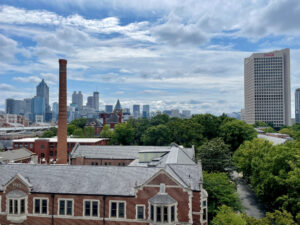
View over south campus from Georgia Tech’s library. Left side view is Downtown, right side is the Coca-Cola headquarter.
© Johannes Götz
Aerospace System Design Laboratory. The most important were Georgia Tech Research Institute, Space System Design Laboratory, various NASA labs, and Georgia Tech’s College of Design. Because of this diversity of partners, meetings were always necessary to keep each other up to date. I worked together with 8 other Graduate Research Assistants. In parallel to my work, I was still working on the DLR Design Challenge remotely. My working hours were 9am-5pm and I spent every day at the institute but was also able to work from home at times. The project does not fall under US export control yet, which made it possible to work in this sector as a foreigner. So, it was a unique opportunity to get to know US work in the space sector.

Georgia Aquarium is one of the largest aquariums in the world. A must-see!
© Johannes Götz
Free Time and Tips for Atlanta
Atlanta offers a wide range of activities, all of which are accessible by bus and train. Besides the famous attractions like the Georgia Aquarium, Hall of Fame College Football, the World of Coca-Cola and the huge Mercedes-Benz Stadium, there are also beautiful parks. Take a walk through the Botanical Garden or visit the photo spot in Piedmont Park overlooking the Midtown skyline. Many series and movies have been filmed in and around Atlanta, including Stranger Things and The Walking Dead. Some movie locations exist in reality and can be visited. A trip to Hawkings Lab from the series Stranger Things, for example, was very memorable. At the Mall of Georgia, movies are shown in real (!) IMAX format. A trip there to see Christopher Nolan’s Oppenheimer was very worthwhile. A trip to Buckhead to visit the design and art museums and see the town there is also ideal for spending free time. For American football, field hockey or – the Americans call it soccer – football fans, there is a wide range of things to do, and watching an authentic football game at Mercedes-Benz Stadium was an unforgettable experience. For connoisseurs and lovers of the famous Rocky Horror Picture Show I can only recommend to experience it with authentic disguises and get a quasi-4D cinema show.
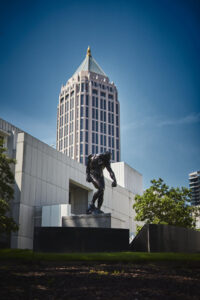
High Museum of Art in north Midtown
© Johannes Götz
The food scene in Atlanta is diverse and a culinary feast for the eyes. Excellent fried chicken, barbecue and coffee shops make you forget the hot summer temperatures there. Rooftop pool parties and cooking together as well as barbecuing together were also part of the everyday unwinding after work.
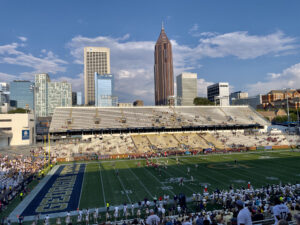
Typical college football game at GT’s home stadium. Go Yellow Jackets!
© Johannes Götz
Conclusion
My research stay in Atlanta was a great enrichment for me personally and an optimal opportunity to apply what I had learned at RWTH and to actively participate in a professional work environment. In addition to the linguistic education, I was able to learn a lot of positive things about American culture. There, a healthy competitive spirit, and a positive attitude towards passionate ambition prevail. These attributes are much more practiced in the U.S. than I thought. The idea of a life’s dream or achieving a good life’s goal is strong there. The students see themselves together in a team, and they also encourage each other to overcome difficult phases in life. I will carry this optimistic and motivating attitude forward. It is a great opportunity for a RWTH student to be able to do such research stays and to represent RWTH and Germany abroad.
Writing a master thesis at KTM Forschungs & Entwicklungs GmbH in Austria
- Automotive Engineering and Transport M.Sc.
- Austria, Salzburg
- KTM Forschungs & Entwicklungs GmbH
- 04/2023 – 09/2023
During this summer semester I did an internship at KTM in Mattighofen, Austria to work on my master thesis. It was a great experience and I totally recommend both, Austria and the company KTM, for an internship abroad.
Application process
In November 2023, I started looking for job postings for a master thesis for the summer semester 2023. I did not particularly look for advertisements abroad, but it was always an option to write my master thesis abroad. Writing your master thesis in a company is an excellent way to recommend yourself for a future employment. At the time of my application, KTM did not offer any master thesis in the relevant fields in their job portal. So, I decided to write a speculative application. I can recommend everyone to do the same if you are interested in a specific company. Often, the departments already have ideas for topics for a thesis, but these have not yet been published as a job advertisement. A few days after my application, I was contacted by the HR department to make an appointment for an interview. At this appointment, the company presented several topics that would have been possible for the master’s thesis. The application process was clearly structured and the HR department always kept me updated.
After finding a company for the master thesis, you need to find a supervisor at university. This can be very challenging. I could not accept an offer from another company be
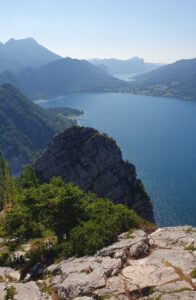
View on Attersee and Mondsee from Großer Schoberstein
© Lukas Rehermann
cause I could not find a supervisor at the university in a reasonable amount of time. In general, I would advise you to ask multiple institutes for supervision at the same time. Even tough I study automotive engineering, my master thesis was not supervised by one of the institutes, which are directly related to automotive engineering, but by a more general mechanical engineering institute. For most institutes, you can see their detailed research fields on their website. The fastest way is to contact the research assistants of the relevant research field directly.
For the Erasmus scholarship application, you need a learning agreement. When I had to submit the application, my learning agreement was not signed by the faculty yet. I could hand in the learning agreement afterwards. In general, applying for the Erasmus internship grant requires less effort than applying for an Erasmus semester at a university. This is mostly related to the recognition process at your faculty.
Accommodation and Living Expenses
After the acceptance by the company, it was time for me to start looking for accommodation. Since Mattighofen is a relatively small town, I looked for shared apartments in Salzburg. The commute from Salzburg to Mattighofen takes about 45 minutes by car or one hour by train. In general, the accommodation search in Salzburg was rather difficult. Especially the fact that I was looking for a room for half a year led to one or the other rejection. I only found a room in a shared apartment a few days before starting work, even though I started looking for a room almost 3 months in advance.
In general, living expenses in Austria are a bit higher than in Germany. Buying groceries and eating in restaurants is more expensive. If you have a car, you can drive to Freilassing in Germany to buy cheaper groceries there. For my room in a shared flat I paid 500 € per month including utilities.
The salaries in Austria for interns are usually higher than in Germany, especially if you already have a bachelor’s degree. Then, the company has to pay you a minimum salary defined in the relevant Kollektivvertrag (collective labor agreement).
Everyday life/the internship
I worked in the vehicle dynamics team at KTM. Of course, most of the time I worked on the research topics of my master thesis. In addition, my colleagues and my supervisor showed me their work, so that I can get a broader overview what the vehicle dynamics team is doing overall. For example, I could sometimes join them on the test track. I felt very comfortable in the team. If I had any questions, everyone took time to help me.
In addition, I was very satisfied with the supervision by university. When writing an external master thesis, it is your job as a student to reconcile the requirements of university and the company. This was eased by the approaches of my supervisors. We agreed that the company was responsible for the research scope requirements and that the university was in lead for the requirements about the documentation. Nevertheless, the university’s supervisor contributed many helpful ideas and provided approaches to solve problems during the research.
Some words about the working conditions: my full-time contract included 38,5 hours per week. I had flexible work time with core times and could take days off using overtime (maximum one day per week). You can work from home maximum 2 days per week. Of course, this also depends on your tasks. In Austria, you usually have 5 weeks of holidays per year. KTM offers many additional benefits for their employees.
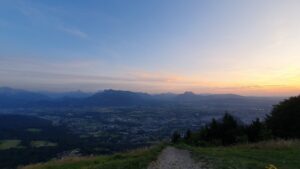
View on the city of Salzburg from Gaisberg
© Lukas Rehermann
Free time/tips
Austria in general is a great destination for an Erasmus semester or internship if you are into outdoor activities. The landscape in the area around Salzburg is amazing! Almost every weekend I went hiking, mountain biking, or similar. I would definitely recommend doing some hikes in Salzkammergut and combine this with swimming in one of the lakes afterwards.
Salzburg is a beautiful city with an amazing old town. There is always something to explore. In addition, many students live in Salzburg. If you try to connect with other people outside work, contact the ESN Salzburg even though you are not an Erasmus student at University of Salzburg. They organize many events, and you can try to connect with other Erasmus students via their WhatsApp group chat.
Conclusion
All in all, I am super happy with my decision to write the master thesis in Austria. I enjoyed the stay there and made many new friendships. I would recommend this to everyone who is interested in going abroad. In the end, I continue working at KTM after finishing my master’s degree.
It is to mention, that an Erasmus internship is a completely different experience than studying at university abroad. Before going to Austria, I already did two Erasmus semesters at universities. When studying, you are way more flexible in planning your free time, for example for travelling. But of course, this does not mean that you do not have any free time during an internship. Especially if you have flexible work time, you can find enough opportunities to extend your weekends for travelling and exploring the country.
Writing a master thesis at Chalmers University of Technology in Gothenburg
- Chemical Engineering M.Sc.
- Sweden, Gothenburg
- Chalmers tekniska högskola
- 04/2023 – 09/2023
Application/Finding an internship
The interest of going abroad was raised in a presentation of my home institute AVT, when they presented their different possibilities for exchange programs in other countries. And since I still wanted to live in another country for a period and improve my English skills, I haven chosen for Sweden. Sounds weird in the first place because Sweden is not officially an English-speaking country. However, I knew that almost all Sweds can fluently speak English. Therefore, I applied at AVT for the exchange of writing my master thesis at Chalmers University of Technology in Gothenburg, Sweden. The exchange between AVT and Chalmers is not a typical type of exchange program that is embedded officially in a Erasmus+ program, but more an agreement between both AVT and the Energy Technology Division of Chalmers. After a while I received feedback from AVT that I can go there in Summer 2023.
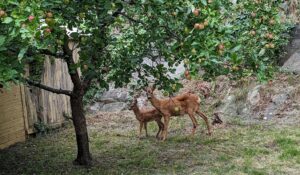
Deers in my backyard.
© Jannik Bothe
However, since the Professor of Chalmers, who has organized the exchange in the past, has left to another University, I had to apply informally to one of the professors at the Energy Technology Division. I then sent my application to a professor who luckily accepted me as well and so the first step of organizing my exchange was done.
Accomodation & Living expenses
As I already read that finding a good accommodation for a reasonable price can be difficult in Gothenburg, I immediately started to queue in for student housing at the student union. For Chalmers, there are the SGS and Chalmers Studentbostäder, which both offers single and shared rooms for students for low prices. However, the queues are extraordinarily long so that normally students must wait for more than one year to get the chance of renting such an accommodation. Therefore, the hope was not too high to get such a chance, and in December 2022 the hope was completely gone as I heard from my Professor at Chalmers that I won’t be enrolled as a student at Chalmers during my exchange. Unfortunately, Chalmers changed some of their regulations for exchange students that are not in an official exchange program, so that officially I was at Chalmers just as an intern. And interns can’t apply for student housing.
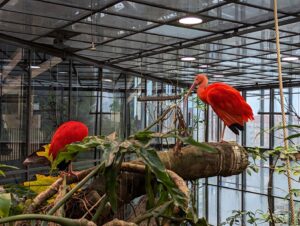
The tropical house in Universeum.
© Jannik Bothe
I then started to search for private accommodation on housinganywhere.com and eventually got lucky with a room in a shared flat with three other people. Housinganywhere is a platform designed for exchange students coming from other countries. When renting a room or an apartment, the first rent is paid to Housinganywhere, and they are sending it to the landlord. In any case something went wrong, or one is fooled by the landlord, Housinganywhere will give you the money back for the first rent, which gave me a good feeling since I had to rent this room without visiting the house or seeing the room in advance.
The room was fully furnished and around 16 m² big. Together with three other students I shared the ground floor with them. We had a very nice and well-equipped kitchen and a – I would say – pretty nature-like garden. It was not a typical student house with many flat, but more a house, which might be built and used by a family in the past. The house was in very calm housing estate in the south-east of Gothenburg called Lunden. In total, my room was 6000 SEK per month, which was around 530 € at that time.
The living cost are generally higher in Sweden than in Germany. However, prices were not that high as I expected them before I came since the prices in Germany for example in the supermarkets got already high due to inflation. In total, I would say that living expenses were around 20 % higher compared to Germany.
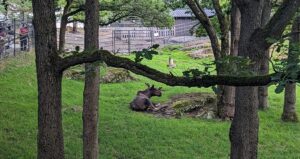
Seeing moos in Slottsskogen park.
© Jannik Bothe
Everyday life/ the internship
After arrival, I went to the university the day after and was kindly welcomed by my new colleagues at the division. My supervisor showed me everything important at the division and has already organized me a desk in advance. From then on, I started to dive into my project with reading into literature and defining the scope. I had the possibility to work from home. However, since the working atmosphere was nice, I went to the division almost every day. Therefore, my every-day-life was more like a typical working-life with a good structure. And since I did not have to take any other courses, I had enough time during the week so that I had not to work on weekends during the whole period of my exchange and was still good in time. In general, I must say that the support my supervisors at Chalmers and my supervisor from AVT was excellent. I never had the problem of not making progress or going into a completely wrong direction. I also have to say that the colleagues of the Division of Energy Technology at Chalmers are so kind and helpful. Everyone offered my help in any case, and I always felt welcome there.
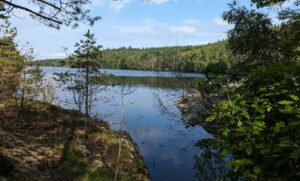
Seeing one of hundreds of lakes during a hike around Gothenburg.
© Jannik Bothe
Free time/tips
For me, free time was highly influenced by the people I me there. Due to my flat mates, I already had a group of people who I shared my free time with. We often were out for a BBQ or on parties, enjoyed the nature or city together or just hang out. Besides spending time with my friends, I enjoyed nature either while running or hiking in the woods. Around Gothenburg there are mainly two long hiking paths called Bohusleden and Gotaleden, which I can highly recommend to everyone who loves nature. The track can be found online, but navigation along the track is not needed since there are sings every 100 meters. Besides hiking, Gothenburg itself offers many possibilities to spend time. My favorite places were the park Slottsskogen where you can see Moos, Kafé Magasinet (delicious pizza & beer), Universeum and Liseberg. Additionally, one should look out for concerts which might take place during the stay. In the stadium Ullevi, many great artists show concerts, and I visited Coldplay there, which was breathtaking. Below, you can find some impressions of my free time in Gothenburg.
Conclusion

Coldplay concert at Ullevi.
© Jannik Bothe
Summarized, the stay in Gothenburg was a very nice experience and a good way to end my whole student life. Even though I sometimes missed my friends and family, I enjoyed my time there, met and got nice friends and can always remember back with a smile on my face. I can recommend Sweden and particularly Gothenburg to everyone who wants to make a new experience outside Germany.
Internship in Bilbao
- Automotive Engineering and Transport M.Sc.
- Spain, Bilbao
- FEV Iberia SI.
- 04/2023 – 09/2023
Application
I wanted to join the Erasmus mobility internship program with the primary goal of gaining international and intercultural experience. An important aspect of my application was that there was no formal process needed, as I had been working with the host company, FEV Consulting GmbH, for approximately half a year as a working student prior to this experience. This established connection eased out the process and facilitated my placement abroad. The choice of Bilbao, Spain as my destination was motivated by my desire to explore a country I had barely visited before, offering me the opportunity to dive into a new culture and language. Moreover, the presence of a FEV Consulting GmbH office in Bilbao made it a fitting location for my internship.
Accommodation and Living Expenses
Finding accommodation in Bilbao proved to be an interesting challenge, as my internship did not align entirely with the typical Erasmus semester. Student accommodations were already occupied, leaving little available options. Luckily, I found a shared apartment on idealista.com, where I lived with young professionals from Spain between the city districts Sarriko and Deusto. The apartment, although located slightly outside the city center, provided a comfortable place to live at a cost of 500€ per month, which included all expenses and even a cleaning service for common areas. It was recently renovated, though my private room was not particularly spacious, and the flat lacked a common living room outside of the kitchen. For future participants seeking accommodation in Bilbao, I recommend joining Facebook or WhatsApp groups for Erasmus students in advance to explore shared housing options. Alternatively, living in a hostel for an initial month while searching for a permanent flat is a viable option. Being present in the city allows for more convenient flat viewing. Important to highlight is not to search for a flat south of Calle Autonomia and the city district San Francisco. Crime rates a quite high and walking in the streets at night can be dangerous as many people get robbed there, even at daytime. Regarding living expenses, I found that approximately 350€ per month covered food and going out. Food prices were comparable to Germany, while drinks in bars were notably more affordable in Spain.
Internship
During my internship, I had an official eight-hour workday contract, although my effective working hours exceeded that throughout the entire internship. Within the consultancy firm, my responsibilities primarily involved desktop research and preparing presentations for the strategic management level of our clients. A significant highlight of my internship was to write my master’s thesis during a customer project, where I developed a Microsoft Excel model for assessing the cost of the battery recycling ecosystem. I also had the opportunity to give presentations in front of the customer, taking on additional responsibilities. Surprisingly, I found no significant cultural or professional differences when compared to the German offices of the company. This allowed me to seamlessly integrate into the work environment while making friends with my Spanish colleagues. The key takeaways in terms of work were advancing my proficiency in Microsoft Excel and internalizing the tools of a consultant. As the corporate language of the company is English, I couldn’t improve my Spanish language skills in the everyday work environment. Therefore, I remotely attended an intensive Spanish course at RWTH Aachen University with a scope of three hours per week, targeting language level A1. I highly recommend attending language courses in case the skills cannot be improved within the work environment.
Free Time
Bilbao offers several free-time activities, including visits to the beach, surfing, and hiking. The city’s closeness to nature and the well-established public transportation system with a metro and buses make these activities easily accessible. A must-visit are Sopelana Beach and Artxanda Mountain in particular. Additionally, I participated in cultural events such as the Pamplona bull run and city festivities that spanned 1.5 months, starting in early July. In Bilbao it is essential to know the Spanish language very well to make local friends, as most Basques do not speak English fluently. Furthermore, the attitude of the Basque people towards foreigners is rather closed, making integration into the society hard. To have a fun time, one should seek for making international friends which is quite easy when meeting other Erasmus students, as most of them have an open-minded attitude. Besides, it might be a good idea to search for tandem partner for both improving the language and getting to know local people. For exploring Bilbao, I highly recommend strolling around the city and visiting many different Pintxo bars. Besides, Bilbao has three main spots to go out. Calle Poza, Calle Ledesma and Casco Viejo. Calle Poza attracts mainly students and young people with its variety of bars. Calle Ledesma is a little bit more expensive and fancier, and the average age of people who go out there is slightly higher than at Poza. Casco Viejo is the old town of Bilbao. It’s very touristic and offers several interesting bars and restaurants at niche spots. Most common to go out are Plaza Nueva and Barrenkale. For those exploring Bilbao’s surroundings, I highly recommend visiting for example Pamplona, San Sebastian, Pikos de Europa, Bermeo, and Gernika. Being in Spain also offers the opportunity to visit Portugal or even Morrocco.
Conclusion
This Erasmus mobility internship experience has left a significant mark on my personal and professional development. I have integrated the lightheartedness of Spanish culture into my everyday life and mindset, which has brought a valuable perspective to my approach to work and life in general. Moreover, I learned the importance of balancing a busy consultant’s lifestyle with enriching free-time activities. This Erasmus+ mobility has further encouraged me to continue exploring foreign countries and cultures in the future. It has consolidated my belief in the great value of international experiences in shaping a well-rounded and adaptable individual.

